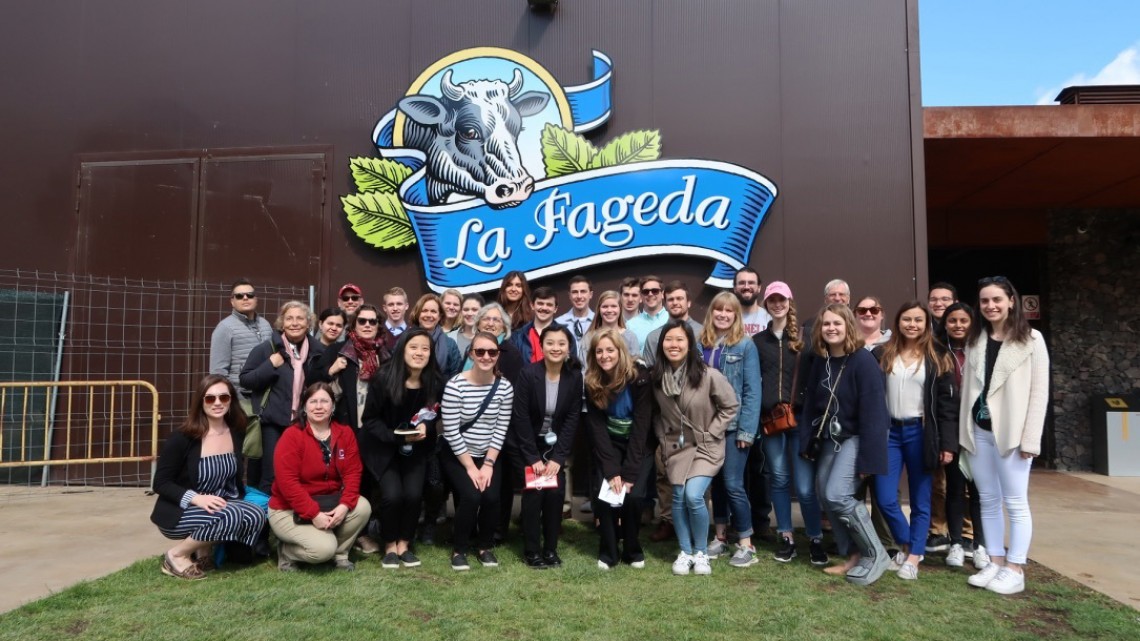
Students visit the former cooperative, La Fageda, that now functions as a dairy farm and social project whose mission is to improve the quality of life and promote the social integration of people from vulnerable groups in Spain.
Students spend spring break studying agribusiness in Spain
By Krisy Gashler
Catherine Wei ’19 is fascinated by the idea that successful businesses are sustained by constructive relationships. So when she saw the opportunity to spend her spring break studying the food production system in Spain, she jumped at the chance.
“I love the fact that our major is called applied economics and management. On this trip, I was not just learning about this from a lecture; I was seeing it firsthand,” Wei said. “You see the nuances and the emotion behind the work that goes into food production.”
Wei was one of 25 students who participated in the weeklong trip to the Catalonia region of Spain. The students visited livestock growing and processing operations, wineries and a hazelnut farm with three faculty advisers: Todd Schmit, associate professor in the Charles H. Dyson School of Applied Economics and Management; Olga Padilla-Zakour, professor and chair of the Department of Food Science; and Elad Tako, courtesy assistant professor in the Department of Food Science and Division of Nutritional Sciences and research physiologist at Cornell’s Robert W. Holley Center for Agriculture and Health, a United States Department of Agriculture Agricultural Research Service facility.
The biennial study abroad trip is co-listed through the Dyson School and the food science department, but it’s open to any student in the College of Agriculture and Life Sciences (CALS), and students across majors participate.
“We have students from food science, Dyson, communication, animal science and others. That kind of heterogeneity helps promote a lot of productive discussion,” Schmit said.
This spring was the 10th international agribusiness trip. Previous study abroad has taken students to Chile, the United Kingdom, Israel, New Zealand, Poland, Hungary, Slovakia, Australia and the Netherlands. Offering the program requires planning and cooperation with a variety of international partners, including current and previous faculty members, alumni, and research and industry partners.
“Without Cornell’s strong international connections, this program couldn’t happen,” Schmit said.
Ekubo Sawaura ’20 grew up on an organic farm in Japan and is studying agricultural sciences. Sawaura has studied agricultural practices firsthand in Portland, Oregon; Madrid, Spain; and now in Catalonia.
“I often compare Japanese and U.S. agriculture, but the differences in scale, population and distribution system between those countries make adopting many of the U.S. practices infeasible back home,” Sawaura said. “Being able to study the production system in a smaller country like Spain was exactly what I needed.”
For Michelle Wen ’19, a highlight of the trip was visiting a yogurt company called La Fageda. Many of the company’s employees have disabilities but are able to do the work necessary to produce the best-selling yogurt in the Catalonia region.
“Their main purpose is not to produce yogurt but rather to empower those with mental disabilities by providing them jobs to help them integrate into society,” she said. “This directly connected with my personal interests of social entrepreneurship and gave me inspiration on what I would like to pursue in the future.”
Sarah Gruntmeir ’19 grew up on a large wheat farm in Oklahoma, and this was her first opportunity to see agricultural production in another country.
“United States agriculturalists have a lot to gain from visiting and discussing with producers that have similar or very different farms,” she said.
Funding for the trip comes from the Dyson School, food science, emeritus professor and former dean of CALS David L. Call, Dyson School alumni, the Northeast Cooperative Council and the Farm Credit Northeast AgEnhancement Program. Students also pay a $1,000 copay to participate, though scholarships are available for low-income students, Schmit said.
Krisy Gashler is a freelance writer for the College of Agriculture and Life Sciences.
Media Contact
Get Cornell news delivered right to your inbox.
Subscribe
